- Home
- Oscar Wilde
The Happy Prince and Other Tales
The Happy Prince and Other Tales Read online
PUFFIN CLASSICS
THE HAPPY PRINCE
AND OTHER STORIES
There fell from heaven a very bright and beautiful star. It slipped down the side of the sky, passing by the other stars in its course, and, as they watched it wondering, it seemed to them to sink behind a clump of willow-trees that stood hard by a little sheepfold no more than a stone’s-throw away.
‘Why! There is a crock of gold for whoever finds it,’ they cried, and they set to and ran, so eager were they for the gold.
OSCAR WILDE
THE HAPPY PRINCE
AND OTHER STORIES
INTRODUCED BY
MARKUS ZUSAK
Illustrations by LARS BO
PUFFIN
PUFFIN BOOKS
Published by the Penguin Group
Penguin Books Ltd, 80 Strand, London WC2R 0RL, England
Penguin Group (USA) Inc., 375 Hudson Street, New York, New York 10014, USA
Penguin Group (Canada), 90 Eglinton Avenue East, Suite 700, Toronto, Ontario, Canada M4P 2Y3
(a division of Pearson Penguin Canada Inc.)
Penguin Ireland, 25 St Stephen’s Green, Dublin 2, Ireland (a division of Penguin Books Ltd)
Penguin Group (Australia), 250 Camberwell Road, Camberwell, Victoria 3124, Australia
(a division of Pearson Australia Group Pty Ltd)
Penguin Books India Pvt Ltd, 11 Community Centre, Panchsheel Park, New Delhi – 110 017, India
Penguin Group (NZ), 67 Apollo Drive, Rosedale, North Shore 0632, New Zealand
(a division of Pearson New Zealand Ltd)
Penguin Books (South Africa) (Pty) Ltd, 24 Sturdee Avenue,
Rosebank, Johannesburg 2196, South Africa
Penguin Books Ltd, Registered Offices: 80 Strand, London WC2R 0RL, England
puffinbooks.com
First published 1888
Published in Puffin Books 1962
Reissued in this edition 2009
Introduction copyright © Markus Zusak, 2009
Endnotes copyright © Penguin Books, 2009
All rights reserved
Except in the United States of America, this book is sold subject to the condition that it shall not, by way of trade or otherwise, be lent, re-sold, hired out, or otherwise circulated without the publisher’s prior consent in any form of binding or cover other than that in which it is published and without a similar condition including this condition being imposed on the subsequent purchaser
ISBN: 978-0-14-195527-8
INTRODUCTION BY
MARKUS ZUSAK
After reading these fairy tales by Oscar Wilde I got into a lot of fights with my friends. It was completely my fault, for I’d asked them which story was their favourite. Every person I gave the book to claimed a different story as the best – and they were willing to fight for it – which is testimony to the strength of these fairy tales. Maybe it’s true that only precious things are really worth fighting for, and when one small book has so many great moments, there’s plenty to argue about. There are a lot of points to score, as well as characters and stories to remember.
When I consider what makes these fairy tales so memorable, I think maybe it’s the fact that they have everything: love, betrayal, selflessness, purity, evil, sacrifice, beauty, brutality and truth. It might also be the fact that, just as surely as one of these tales will break your heart, the next will mend it. The more I dug in and fought for my favourite story, the more I could see how wonderful the others were too. I wanted to read them again, just to make sure of it, and it was a place I was happy to return to.
After all, it’s beautiful to watch the Happy Prince ask the Swallow to pluck the jewels and gold from him, piece by piece, to help the poor people of the town. It’s memorable to seethe as the Miller abuses the good grace of the devoted friend. It’s a pleasure to see the Selfish Giant suddenly understand why he’s so cold. And that’s just the tip of the iceberg. For in these pages there are rockets with attitude problems, young kings who shouldn’t go to sleep, beautiful witches, dancing dwarves and children who fall from the sky only to be gorgeous but ugly, and then ugly but beautiful. There’s something in these fairy tales that reminds me why any of us would want to be readers and writers in the first place, and that is that, the more amazing the stories become, the more I believe them, and the more I realize that I won’t forget them.
In a way, being with these stories is a little like what happens to the Fisherman in the last tale. Something is cut free and let go inside this Oscar Wilde world. It’s a place to travel through and discover things… and we actually come out better for it. Maybe it’s because there’s a lot of heart in every page, and many strange and wonderful things to believe and remember. Even now I recall the most memorable moments, and I will lay it on the line by saying that my favourite tale in here is ‘The Nightingale and the Rose’. It is so sad, so brave, and I will always remember the bird who gives her lifeblood the way she does. Still, it’s very likely you’ll prefer one of the others, and I’ll be more than happy to argue with you if we ever run into each other. For some reason, I think Oscar Wilde might have enjoyed the thought of that.
Contents
The Happy Prince
The Selfish Giant
The Devoted Friend
The Remarkable Rocket
The Nightingale and the Rose
The Young King
The Birthday of the Infanta
The Star-Child
The Fisherman and his Soul
The Happy Prince
High above the city, on a tall column, stood the statue of the Happy Prince. He was gilded all over with thin leaves of fine gold, for eyes he had two bright sapphires, and a large red ruby glowed on his sword-hilt.
He was very much admired indeed. ‘He is as beautiful as a weathercock,’ remarked one of the Town Councillors who wished to gain a reputation for having artistic tastes; ‘only not quite so useful,’ he added, fearing lest people should think him unpractical, which he really was not.
‘Why can’t you be like the Happy Prince?’ asked a sensible mother of her little boy who was crying for the moon. ‘The Happy Prince never dreams of crying for anything.’
‘I am glad there is someone in the world who is quite happy,’ muttered a disappointed man as he gazed at the wonderful statue.
‘He looks just like an angel,’ said the Charity Children as they came out of the cathedral in their bright scarlet cloaks and their clean white pinafores.
‘How do you know?’ said the Mathematical Master, ‘you have never seen one.’
‘Ah! but we have, in our dreams,’ answered the children; and the Mathematical Master frowned and looked very severe, for he did not approve of children dreaming.
One night there flew over the city a little Swallow. His friends had gone away to Egypt six weeks before, but he had stayed behind, for he was in love with the most beautiful Reed. He had met her early in the spring as he was flying down the river after a big yellow moth, and had been so attracted by her slender waist that he had stopped to talk to her.
‘Shall I love you?’ said the Swallow, who liked to come to the point at once, and the Reed made him a low bow. So he flew round and round her, touching the water with his wings, and making silver ripples. This was his courtship, and it lasted all through the summer.
‘It is a ridiculous attachment,’ twittered the other Swallows; ‘she has no money, and far too many relations’; and indeed the river was quite full of Reeds. Then, when the autumn came they all flew away.
After they had gone he felt lonely, and began to tire of his lady-love. ‘She has no conversation,’ he said, ‘and I am afraid that she is a coquette, for she is always flir
ting with the wind.’ And certainly, whenever the wind blew, the Reed made the most graceful curtsies. ‘I admit that she is domestic,’ he continued, ‘but I love travelling, and my wife, consequently, should love travelling also.’
‘Will you come away with me?’ he said finally to her, but the Reed shook her head, she was so attached to her home.
‘You have been trifling with me,’ he cried. ‘I am off to the Pyramids. Good-bye!’ and he flew away.
All day long he flew, and at night-time he arrived at the city. ‘Where shall I put up?’ he said; ‘I hope the town has made preparations.’
Then he saw the statue on the tall column.
‘I will put up there,’ he cried; ‘it is a fine position, with plenty of fresh air.’ So he alighted just between the feet of the Happy Prince.
‘I have a golden bedroom,’ he said softly to himself as he looked round, and he prepared to go to sleep; but just as he was putting his head under his wing a large drop of water fell on him. ‘What a curious thing!’ he cried; ‘there is not a single cloud in the sky, the stars are quite clear and bright, and yet it is raining. The climate in the north of Europe is really dreadful. The Reed used to like the rain, but that was merely her selfishness.’
Then another drop fell.
‘What is the use of a statue if it cannot keep the rain off?’ he said; ‘I must look for a good chimney-pot,’ and he determined to fly away.
But before he had opened his wings, a third drop fell, and he looked up, and saw – Ah! what did he see?
The eyes of the Happy Prince were filled with tears, and tears were running down his golden cheeks. His face was so beautiful in the moonlight that the little Swallow was filled with pity.
‘Who are you?’ he said.
‘I am the Happy Prince.’
‘Why are you weeping then?’ asked the Swallow; ‘you have quite drenched me.’
‘When I was alive and had a human heart,’ answered the statue, ‘I did not know what tears were, for I lived in the Palace of Sans-Souci, where sorrow is not allowed to enter. In the daytime I played with my companions in the garden, and in the evening I led the dance in the Great Hall. Round the garden ran a very lofty wall, but I never cared to ask what lay beyond it, everything about me was so beautiful. My courtiers called me the Happy Prince, and happy indeed I was, if pleasure be happiness. So I lived, and so I died. And now that I am dead they have set me up here so high that I can see all the ugliness and all the misery of my city, and though my heart is made of lead yet I cannot choose but weep.’
‘What! is he not solid gold?’ said the Swallow to himself. He was too polite to make any personal remarks out loud.
‘Far away,’ continued the statue in a low musical voice, ‘far away in a little street there is a poor house. One of the windows is open, and through it I can see a woman seated at a table. Her face is thin and worn, and she has coarse, red hands, all pricked by the needle, for she is a seamstress. She is embroidering passion-flowers on a satin gown for the loveliest of the Queen’s maids-of-honour to wear at the next Court ball. In a bed in the corner of the room her little boy is lying ill. He has a fever, and is asking for oranges. His mother has nothing to give him but river water, so he is crying. Swallow, Swallow, little Swallow, will you not bring her the ruby out of my sword-hilt? My feet are fastened to this pedestal and I cannot move.’
‘I am waited for in Egypt,’ said the Swallow. ‘My friends are flying up and down the Nile, and talking to the large lotus-flowers. Soon they will go to sleep in the tomb of the great King. The King is there himself in his painted coffin. He is wrapped in yellow linen, and embalmed with spices. Round his neck is a chain of pale green jade, and his hands are like withered leaves.’
‘Swallow, Swallow, little Swallow,’ said the Prince, ‘will you not stay with me for one night, and be my messenger? The boy is so thirsty, and the mother so sad.’
‘I don’t think I like boys,’ answered the Swallow. ‘Last summer, when I was staying on the river, there were two rude boys, the miller’s sons, who were always throwing stones at me. They never hit me, of course; we swallows fly far too well for that, and besides I come of a family famous for its agility; but still, it was a mark of disrespect.’
But the Happy Prince looked so sad that the little Swallow was sorry. ‘It is very cold here,’ he said; ‘but I will stay with you for one night, and be your messenger.’
‘Thank you, little Swallow,’ said the Prince.
So the Swallow picked out the great ruby from the Prince’s sword, and flew away with it in his beak over the roofs of the town.
He passed by the cathedral tower, where the white marble angels were sculptured. He passed by the palace and heard the sound of dancing. A beautiful girl came out on the balcony with her lover. ‘How wonderful the stars are,’ he said to her, ‘and how wonderful is the power of love!’
‘I hope my dress will be ready in time for the State ball,’ she answered; ‘I have ordered passion-flowers to be embroidered on it: but the seamstresses are so lazy.’
He passed over the river, and saw the lanterns hanging to the masts of the ships. He passed over the Ghetto, and saw the old Jews bargaining with each other, and weighing out money in copper scales. At last he came to the poor house and looked in. The boy was tossing feverishly on his bed, and the mother had fallen asleep, she was so tired. In he hopped, and laid the great ruby on the table beside the woman’s thimble. Then he flew gently round the bed, fanning the boy’s forehead with his wings. ‘How cool I feel!’ said the boy, ‘I must be getting better’; and he sank into a delicious slumber.
Then the Swallow flew back to the Happy Prince, and told him what he had done. ‘It is curious,’ he remarked, ‘but I feel quite warm now, although it is so cold.’
‘That is because you have done a good action,’ said the Prince. And the little Swallow began to think, and then he fell asleep. Thinking always made him sleepy.
When day broke he flew down to the river and had a bath. ‘What a remarkable phenomenon!’ said the Professor of Ornithology as he was passing over the bridge. ‘A swallow in winter!’ And he wrote a long letter about it to the local newspaper. Everyone quoted it, it was full of so many words that they could not understand.
‘Tonight I go to Egypt,’ said the Swallow, and he was in high spirits at the prospect. He visited all the public monuments, and sat a long time on top of the church steeple. Wherever he went the Sparrows chirruped, and said to each other, ‘What a distinguished stranger!’ so he enjoyed himself very much.
When the moon rose he flew back to the Happy Prince. ‘Have you any commissions for Egypt?’ he cried; ‘I am just starting.’
‘Swallow, Swallow, little Swallow,’ said the Prince, ‘will you not stay with me one night longer?’
‘I am waited for in Egypt,’ answered the Swallow. ‘Tomorrow my friends will fly up to the Second Cataract. The river-horse couches there among the bulrushes, and on a great granite throne sits the God Memnon. All night long he watches the stars, and when the morning star shines he utters one cry of joy, and then he is silent. At noon the yellow lions come down to the water’s edge to drink. They have eyes like green bells, and their roar is louder than the roar of the cataract.’
‘Swallow, Swallow, little Swallow,’ said the Prince, ‘far away across the city I see a young man in a garret. He is leaning over a desk covered with papers, and in a tumbler by his side there is a bunch of withered violets. His hair is brown and crisp, and his lips are red as a pomegranate, and he has large and dreamy eyes. He is trying to finish a play for the Director of the Theatre, but he is too cold to write any more. There is no fire in the grate, and hunger has made him faint.’
‘I will wait with you one night longer,’ said the Swallow, who really had a good heart. ‘Shall I take him another ruby?’
‘Alas! I have no ruby now,’ said the Prince: ‘my eyes are all that I have left. They are made of rare sapphires, which were brought out of India a thousand
years ago. Pluck out one of them and take it to him. He will sell it to the jeweller, and buy firewood, and finish his play.’
‘Dear Prince,’ said the Swallow, ‘I cannot do that’; and he began to weep.
‘Swallow, Swallow, little Swallow,’ said the Prince, ‘do as I command you.’
So the Swallow plucked out the Prince’s eye, and flew away to the student’s garret. It was easy enough to get in, as there was a hole in the roof. Through this he darted, and came into the room. The young man had his head buried in his hands, so he did not hear the flutter of the bird’s wings, and when he looked up he found the beautiful sapphire lying on the withered violets.
‘I am beginning to be appreciated,’ he cried; ‘this is from some great admirer. Now I can finish my play,’ and he looked quite happy.
The next day the Swallow flew down to the harbour. He sat on the mast of a large vessel and watched the sailors hauling big chests out of the hold with ropes. ‘Heave a-hoy!’ they shouted as each chest came up. ‘I am going to Egypt!’ cried the Swallow, but nobody minded, and when the moon rose he flew back to the Happy Prince.
‘I am come to bid you good-bye,’ he cried.
‘Swallow, Swallow, little Swallow,’ said the Prince, ‘will you not stay with me one night longer?’
‘It is winter,’ answered the Swallow, ‘and the chill snow will soon be here. In Egypt the sun is warm on the green palm-trees, and the crocodiles lie in the mud and look lazily about them. My companions are building a nest in the Temple of Baalbek, and the pink and white doves are watching them, and cooing to each other. Dear Prince, I must leave you, but I will never forget you, and next spring I will bring you back two beautiful jewels in place of those you have given away. The ruby shall be redder than a red rose, and the sapphire shall be as blue as the great sea.’
‘In the square below,’ said the Happy Prince, ‘there stands a little match-girl. She has let her matches fall in the gutter, and they are all spoiled. Her father will beat her if she does not bring home some money, and she is crying. She has no shoes or stockings, and her little head is bare. Pluck out my other eye, and give it to her, and her father will not beat her.’

 The Picture of Dorian Gray
The Picture of Dorian Gray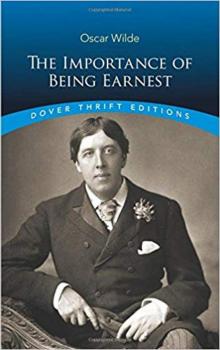 The Importance of Being Earnest
The Importance of Being Earnest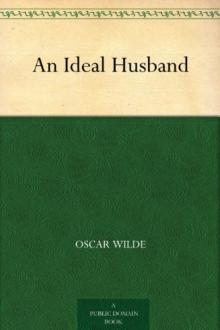 An Ideal Husband
An Ideal Husband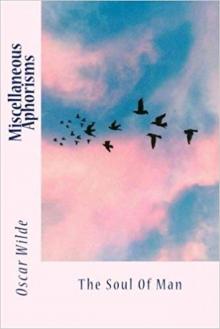 Miscellaneous Aphorisms; The Soul of Man
Miscellaneous Aphorisms; The Soul of Man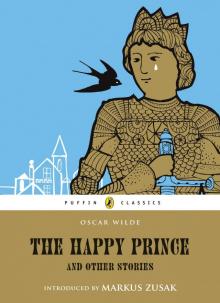 The Happy Prince and Other Tales
The Happy Prince and Other Tales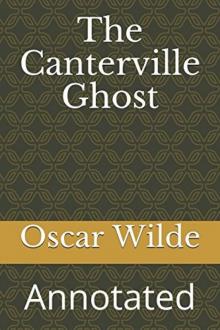 The Canterville Ghost: Annotated
The Canterville Ghost: Annotated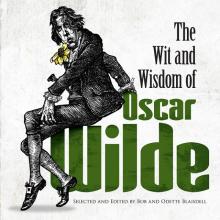 The Wit and Wisdom of Oscar Wilde
The Wit and Wisdom of Oscar Wilde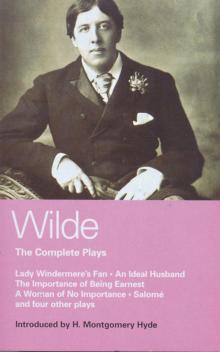 The Complete Plays
The Complete Plays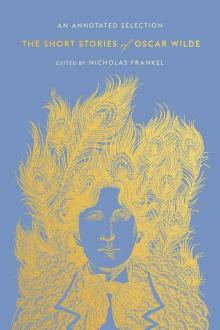 The Short Stories of Oscar Wilde
The Short Stories of Oscar Wilde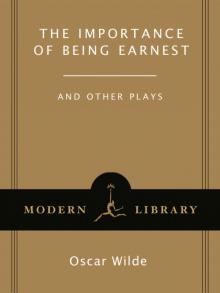 The Importance of Being Earnest: And Other Plays
The Importance of Being Earnest: And Other Plays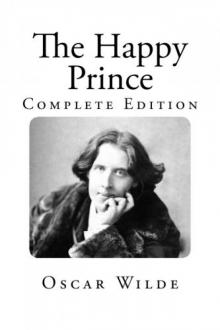 The Happy Prince (Oscar Wilde Classics)
The Happy Prince (Oscar Wilde Classics)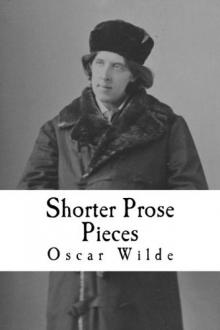 Shorter Prose Pieces
Shorter Prose Pieces Importance of Being Earnest
Importance of Being Earnest Selected Tales: Shorter Prose Pieces
Selected Tales: Shorter Prose Pieces The Penny Dreadfuls MEGAPACK™
The Penny Dreadfuls MEGAPACK™ The Complete Short Fiction
The Complete Short Fiction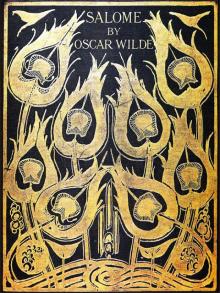 The Illustrated Salomé in English & French (with Active Table of Contents)
The Illustrated Salomé in English & French (with Active Table of Contents)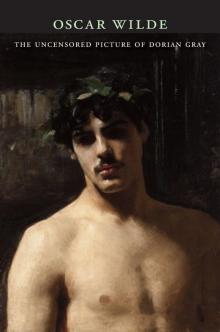 The Uncensored Picture of Dorian Gray
The Uncensored Picture of Dorian Gray Oscar Wilde Miscellaneous: A Florentine Tragedy - a Fragment, and La Sainte Courtisane - a Fragment
Oscar Wilde Miscellaneous: A Florentine Tragedy - a Fragment, and La Sainte Courtisane - a Fragment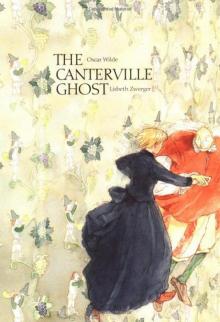 The Canterville Ghost (Illustrated by WALLACE GOLDSMITH)
The Canterville Ghost (Illustrated by WALLACE GOLDSMITH) Complete Works of Oscar Wilde
Complete Works of Oscar Wilde The Picture of Dorian Gray: The Uncensored Original Text (Annotated) (First Ebook Edition)
The Picture of Dorian Gray: The Uncensored Original Text (Annotated) (First Ebook Edition)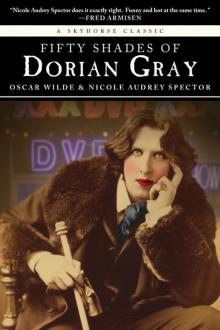 Fifty Shades of Dorian Gray
Fifty Shades of Dorian Gray Oscar Wilde's Stories for All Ages
Oscar Wilde's Stories for All Ages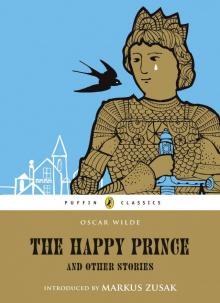 The Happy Prince & Other Stories (Puffin Classics Relaunch)
The Happy Prince & Other Stories (Puffin Classics Relaunch)